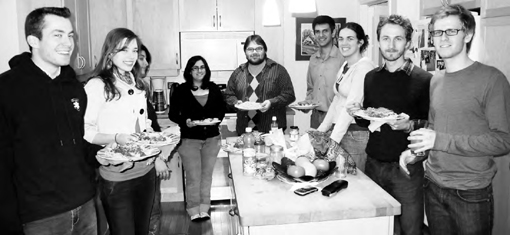
March 12, 2009
Faith
on campus: The Bahá’í Faith
by Andrea Hill
Beginning March 2, Bahá’í
followers worldwide are fasting in a lead-up to the Bahá’í New Year on
March 21. Among these followers are university students, many of whom
are involved with campus Bahá’í associations.

Members
of Carleton’s Bahá’í group gathered for a bite after a full day of
fasting.
“Bahá’í is the youngest
of the world’s independent religions,”
explained Negar Honarmandan from the external affairs department of the
Bahai National Centre. Followers believe in one God who progressively
reveals his will to humanity and they believe the most recent of God’s
messengers is Bahá’u’lláh, who was born in 1817.
According to the Bahá’í Community of Canada’s website, individuals of
various races and ethnicities practice the religion in over 200
countries. There are about 30,000 followers in Canada and most Canadian
universities have a student association devoted to the faith.
Honarmandan said followers must rely on their own initiative to follow
the faith. “Nobody’s there to check up on. . . . We don’t have clergy
or priests. There’s no such thing as confession because it’s your own
relationship with God — it’s in your own conscience.”
This makes Bahá’í student associations so important because it brings
Bahá’í students together and offers them a supportive community.
Fourth-year environmental sciences student Samuel Benoit is the
external secretary of Carleton’s Association for Baha’i Studies, a
group that teaches about the Bahá’í religion by sponsoring activities
such as lectures, conferences and informal gatherings, and by
distributing literature on the Bahá’í faith.
“I can’t say that it’s very difficult at all [to practice Bahá’í while
in university],” Benoit said.
“Bahá’ís place a very, very high value on higher education, so I think
many of us are just grateful to be at university and to be engaging in
dialogue and studying arts and sciences.”
“Bahá’u’lláh described education as being a process of mining gems,”
Benoit explained. “We see education
as uncovering what’s already there, so by imparting skills and
knowledge it gives people the capacity to fi ll their
potential.”
Once Bahá’ís reach the age of 15, they are required to perform an
obligatory prayer each day. Although there is no place on the Carleton
campus reserved for this, Benoit said he does not have a problem
pulling out his compass, facing northeast (towards where Bahá’u’lláh is
buried) and saying a quiet prayer on campus.
Benoit said there are three types of obligatory prayers: long, medium
and short. The long prayer involves motions similar to a Muslim prayer
whereas the short prayer simply involves reciting a short verse.
“Frankly, I just do the short prayer,” Benoit said. “There’s no
hierarchy. There’s no concept of one being better than the other.”
Bahá’í followers acknowledge a handful of holy days throughout the year
during which they are not permitted to work or go to school. These
dates are recognized by Carleton’s equity services and Benoit fi nds
the professors very accommodating.
Besides teaching the Bahá’í faith, the Association of Bahá’í Studies is
currently working to raise awareness of the persecution of Bahá’ís in
Iran.
“We’re particularly interested, as an association, in the denial of
access to higher education,” Benoit said. “For more than 30 years,
pretty much since the Islamic revolution, the community there has been
denied access to higher education and that has had a devastating
effect.”
Apart from raising awareness of the issue, the association is
encouraging people to write letters of protest to organizations such as
the United Nations.
Printed in the The
Charlatan, March 12 - 18, 2009 Volume 38, Issue 26
Carleton University, Ottawa
|